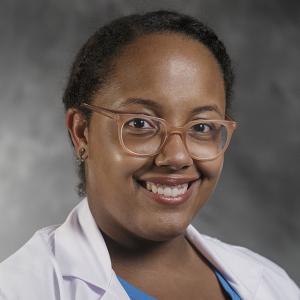
she/her
Hometown
Columbia, SC
What are your career goals?
After residency, I hope to work in an outpatient community clinic providing healthcare to underserved patients. I also hope to be meaningfully engaged in community health initiatives and advocacy to help address healthcare disparities affecting marginalized communities.
What attracted you to the Duke Family Medicine Residency Program?
From my first introduction to the program at the 2020 AAFP National Conference, Duke Family Medicine made it clear that they valued diversity in both residents and faculty and vocally expressed a desire to bring about social justice through medicine. The Second Look program for URM students ultimately helped me make my decision to rank Duke #1, as I had the opportunity to see URM trainees across specialties being celebrated and finding a sense of community.
In your opinion, what makes Duke Family Medicine special?
In addition to rigorous training, I specifically sought a residency program that would support my professional and personal growth while enabling me to remain attuned to and capable of addressing the needs of my patients and the broader community; Duke more than fit the bill.
What strengths or skills do you have that could be of benefit to the community?
I have extensive hands-on experience in primary care, from completing a year of service as a clinic facilitator at an FQHC in Montgomery County, Maryland prior to medical school to serving on the board of my medical school's student-run free clinic as an M2. As a med student, I also engaged in extensive coursework focused on primary care through the South Carolina Area Health Education Consortium (AHEC) Scholars Program. I have been involved in organized medicine via the SNMA (National Health Policy and Legislative Action Committee) and AAFP (AAFP Foundation 2020-2021 Emerging Leaders Institute) and mentored URM pre-med and medical students throughout my time in medical school. Lastly, I have a personal and academic interest in addressing the historical and ongoing mistreatment of Black patients and other patients of color: I led an interprofessional medical humanities discussion group on race and medicine while in medical school.
What are you passionate about?
My personal and educational background compels me to think about the societal and interpersonal relations that shape patient interactions, including past and present-day racism against people of color and the resultant earned distrust in our communities. In undergrad, I completed a thesis on Black women’s activism and Alice Walker’s theory of womanism, which she defines in part as being “committed to [the] survival and wholeness of entire people.” Family Medicine allows me to enact my concern for the community’s wholeness, from pediatrics to geriatric care and everything in between. Across all ages, the risks to one’s health are unjustly heightened for marginalized patients. In my view, my role as a physician is not only to help individual patients navigate illness through culturally-responsive medicine, but also to help eliminate societal barriers to care through eliminating inequities (e.g. race-based medicine, the Black maternal health crisis, and so many others), mentoring the next generation of URM physicians, and being an active advocate for my community.
What are your hobbies outside of work?
In my free time, I enjoy cooking, reading, listening to music, taking walks in beautiful surroundings, and playing the piano.
What is something interesting that not many people know about you?
I've sung in various choirs from middle school through med school, which granted me the opportunity to travel around the continental U.S., Canada, Poland, and Austria on choir trips.
So far, what has surprised you most about Duke?
Despite coming from a world-famous institution, everyone I've met has been so down-to-earth, welcoming, and supportive during the transition to residency.
Education and Training
Medical University of South Carolina College of Medicine (Medical Education-MD)
University of Notre Dame, B.S. in Science Preprofessional Studies & Africana Studies (Undergraduate)